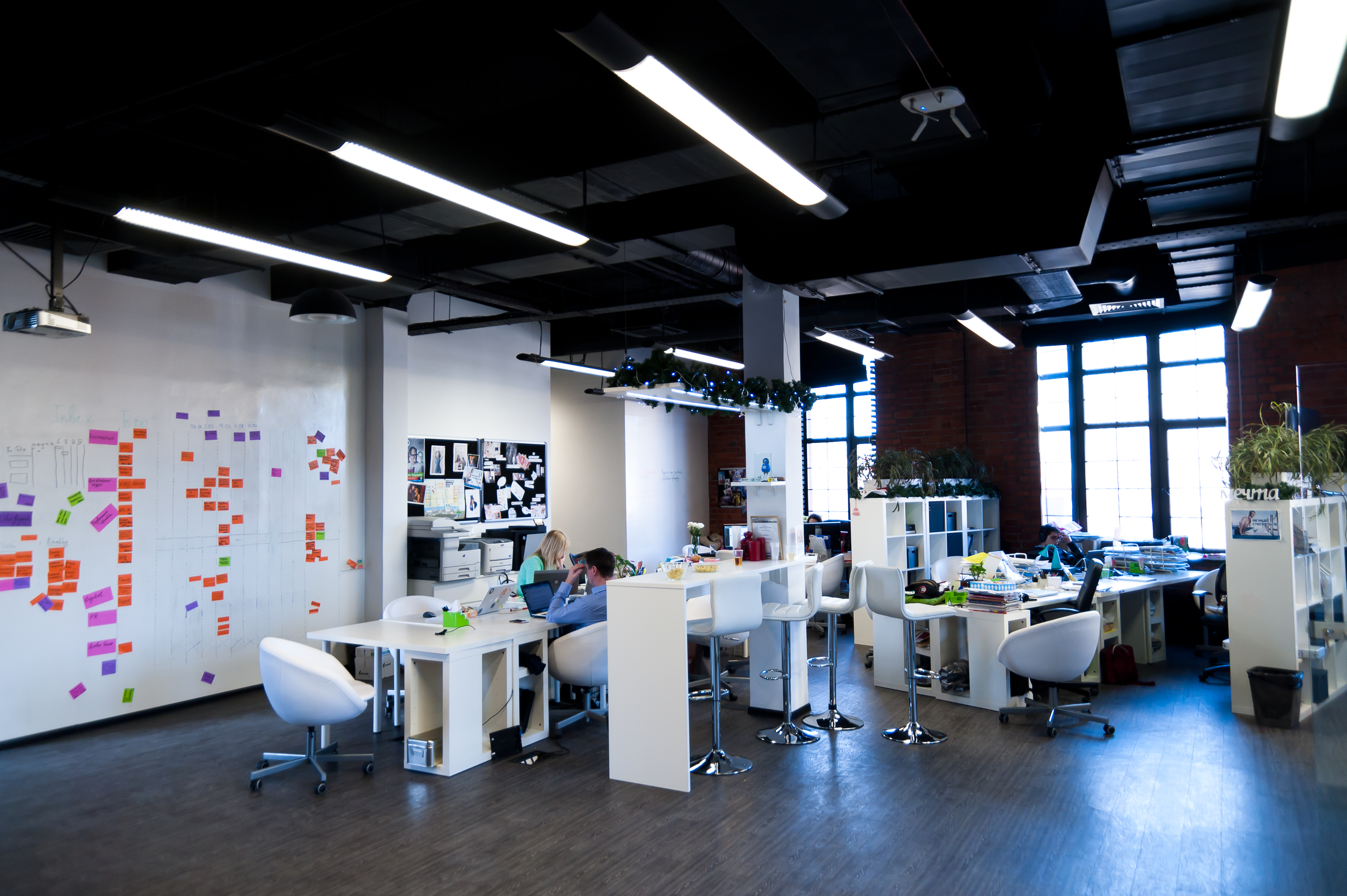
Why These Coworking Spaces In Train Stations Let You Pay In “Social Capital”
FAST COMPANY: Is the free coworking space that’s giving 80,000 people desks in vacant areas of schools, hospitals, and train stations the future of work?
Steps from the Utrecht Centraal Railway Station in the Netherlands, through a dizzying mall of winding pathways dense with the scent of freshly baked pastries, nestled between the exit of a grocery store and a restaurant whose tables and chairs spill far into the open hallway, through a glass door, then past another code-locked door, up a flight of stairs and down a hallway sits a group of 80 or so freelancers and startup employees at one of the city’s many free coworking spaces. The covert space comes with free Wi-Fi and printer access, free coffee and tea, free chairs and desks, and even free lunch.
Their host is an organization called Seats2Meet, and their members can reserve any seat in the company’s 60 locations across Europe online. Prior to arriving, members build an online profile to state who they are, what they’re working on that day, and what they consider their area of expertise. Upon entering the workspace they receive an email, via the Seats2Meet Connect application, containing the profiles of some of their neighbors and desk mates for the day, whose projects and expertise most closely align with their own.
Seats2Meet’s vast network of permanent and temporary locations—95% of which are based in the Netherlands—often take advantage of excess space in accounting offices, event venues, schools, libraries, hospitals, train stations, and other spaces that are otherwise not fully used to capacity.
The organization offers nearly 80,000 seats across its locations in exchange for nothing more than “social capital,” or the sharing of knowledge and expertise, while another 240,000 chairs, located in the meeting rooms and private offices of Seats2Meet locations, range from €20 to €60 ($22 to $65) per person per day.
HOW DO YOU PAY IN SOCIAL CAPITAL?
Those paying in social capital earn their keep by supporting the projects of both paying and nonpaying members, often through beta testing or strategic advice in their area of expertise. “They can pay by sharing their knowledge,” said Ronald van den Hoff, the company’s 61-year-old founder and CEO, sitting inside one of the 23 meeting rooms of Seats2Meet’s flagship location in Utrecht.
The company also earns revenue through its loosely governed franchise system that only requires their location managers to keep 20% of space available for those who pay in social capital, and contributes €2 from each paid seat back to HQ. Seats2Meet also allows private organizations access to Seats2Meet Connect for €95 ($103) per month, providing them with a large network of talent to draw from.
“At this moment we don’t have a sales and marketing department, we don’t have a PR department,” said Van den Hoff, adding that members have created buzz using social media. “When we started in 2005, I employed 250 people full time. Now the organization is 10 times larger, only we employ 15 people.”
With new branches opening in Ecuador, the U.K., Egypt, Brazil, and Japan, Van den Hoff says there’s “no reason” why the Seats2Meet model wouldn’t be successful in North America as well.
IS THIS THE FUTURE OF WORK?
Temporary office-rental options are already abundant in most parts of Canada and the United States, but free coworking spaces are few and far between.
Julien Smith, however, doesn’t think traditional coworking spaces in North America are going to be disrupted by new and innovative models coming out of Europe by way of companies like Seats2Meet, Hoffice, and Bouncespace. As the founder of Breather—which offers office-space rentals in San Francisco, Montreal, New York, Ottawa, and Boston—Smith has seen a number of coworking and office-rental companies try and fail to convert free members into paying customers in North America in the past.
“They’re competing with every seat in the world; a park bench, a local cafe, sitting on the stoop outside a building,” he said. “It’s very difficult to offer a high-priced service and aggregate demand when competition is a $5 coffee.”
Add to that list cloud-based web development platform Wix, which offers six months’ worth of free coworking space—including a desk and chair, Wi-Fi and printing services, a kitchenette with coffee and tea, even conference and meeting rooms—to 75 of its San Francisco-based users, and 95 in New York. While many members are paying users of the company’s premium services—spending between $4 and $12 a month—others enjoy free office space in exchange for using the company’s free services.
“It’s all out of pocket for us, we don’t charge for any of the services we provide in either one of our coworking spaces,” said Sandy Selinger, the North American offline marketing manager for Wix, adding that Wix only asks its members for customer feedback and the ability to use success stories for marketing purposes. “Being able to tell that story is something that is very useful to us.”
LOWER-CASE FREE
Selinger says that he is familiar with the free coworking model that is growing in popularity in Europe, but adds that such organizations often ask something in return.
“I would call it lower-case ‘free,’ because there is usually some level of contribution,” he said. “Sometimes it’s paying for more elaborate services, and in other cases it’s a matter of actually helping in managing the coworking space itself.”
Such is the model at Dallas Fort Work, whose Frontline program—like many coworking spaces in North America—provides a number of free work stations to members who spend one day of their week working from the front desk, greeting visitors, organizing schedules, and providing tours.
“By taking on the barter in this way, and not requiring us to staff a full-time person to actually be on the frontline, they’re essentially making it cheaper for everybody, because they’re allowing us to operate at a lower cost,” said Oren Salomon, the founder of Dallas Fort Work. “Some of our frontline people—and we’ve only had this program going for a month and a half—they’re picking up freelance gigs and side jobs from the people they meet just sitting at the front door.”
Salomon adds that he is concerned that the model utilized by companies like Seats2Meet might create a divide between paying and nonpaying members of the community. “Without the people that pay, the whole system would fall apart, so there really is no free lunch, it’s the other people that are paying for it,” he said.
He also warns that while the model has seen success in Europe, a system that allows members to pay in the loosely defined currency of social capital could lead to abuse in North America. “If someone is working there and choosing not to contribute cash, I’m not sure they’re going to make the optimal decisions for the community. I haven’t seen that play out so well in the U.S.”
While Salomon has his doubts, he adds that the success of newer models will only help elevate the concept of coworking.
“I welcome all forms of diversity that people want to try,” he said. “There’s no one true form of coworking, that would be against the very concept of it.”





